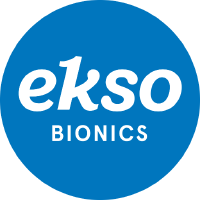
FMP

Ekso Bionics Holdings, Inc.
EKSO
NASDAQ
Ekso Bionics Holdings, Inc. designs, develops, sells, and rents exoskeleton products in the Americas, Europe, the Middle east, Africa, the Asia Pacific, and internationally. The company operates in two segments, EksoHealth and EksoWorks. The EksoHealth segment designs, engineers, manufactures, and markets exoskeletons for applications in the medical markets. The EksoWorks segment designs, engineers, manufactures, and markets exoskeleton devices to allow able-bodied users to perform difficult repetitive work for extended periods. It also provides EksoNR, a wearable bionic suit and rehabilitation device that assists physical therapists and physicians to treat patients with acquired brain injury, stroke, and spinal cord injury; and EksoUE is a wearable upper extremity assistive device that helps to reduce the effect of gravity on the wearer's shoulders and arms. Ekso Bionics Holdings, Inc. has a license agreement with Lockheed Martin Corporation. The company was incorporated in 2005 and is headquartered in Richmond, California.
0.62 USD
0.0095 (1.53%)
DuPont Analysis
The DuPont analysis, pioneered by the DuPont Corporation, offers a structured approach to assessing fundamental performance. It involves breaking down the return on equity (ROE) into various components, aiding investors in comprehending the factors influencing a company's returns.
ROE = Net Income / Average Total Equity
ROE = (Net Income / Sales) * (Revenue / Average Total Assets) * (Average Total Assets / Average Total Equity)
The company's tax burden is (Net income ÷ Pretax profit). This is the proportion of the company's profits retained after paying income taxes. [NI/EBT] The company's interest burden is (Pretax income ÷ EBIT). This will be 1.00 for a firm with no debt or financial leverage. [EBT/EBIT] The company's operating income margin or return on sales (ROS) is (EBIT ÷ Revenue). This is the operating income per dollar of sales. [EBIT/Revenue] The company's asset turnover (ATO) is (Revenue ÷ Average Total Assets). The company's equity multiplier is (Average Total Assets ÷ Average Total Equity). This is a measure of financial leverage. Profitability (measured by profit margin) Asset efficiency (measured by asset turnover) Financial leverage (measured by equity multiplier)